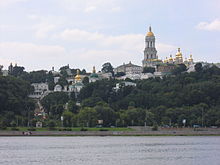Liturgy of St. John Chrysostom (Leontovych)
The Liturgy of St. John Chrysostom (Ukrainian: Літургія Івана Златоустого, tr. Liturhiya Ivana Zlatoustoho) is the musical setting of the Divine Liturgy of St. John Chrysostom by Mykola Leontovych. Consistent with Orthodox tradition, in which service is sung exclusively a cappella,[1] the piece is set for unaccompanied choir and soloist. It was first performed in the Mykolaiv Cathedral at the Kyiv Pechersk Lavra on May 22, 1919,[2] with Leontovych himself conducting.[3]
History
[edit]
The Divine Liturgy of St. John Chrysostom is the most commonly performed liturgy in the Eastern Church.[4] The liturgy was developed into a distinct musical genre in the eastern tradition, as the mass was in western traditions. Some composers with well-known liturgies, besides Leontovych himself, include Mykola Dyletsky, Artem Vedel, Dmytro Bortnianskiy, Maksym Berezovsky, Sergei Rachmaninoff, Pyotr Ilyich Tchaikovsky, and Pavel Chesnokov, among others.[5]
Mykola Leontovych had a professional theological education from the theological seminary in Kamianets-Podilskiy, and spent a portion of his career as a priest. When the Ukrainian Autocephalous Orthodox Church was established and recognized in 1918, Leontovych joined in the movement. His musical output began to reflect this as he started to publish works of a religious nature such as "На воскресіння Христа" (On the Resurrection of Christ), "Хваліте ім’я Господнє" (Praise ye the name of the Lord), and "Світе тихий" (Oh quiet light).[2]
Leontovych completed the liturgy in February 1919 and conducted the debut performance of the work on May 19 of the same year in the Mykolaiv Cathedral in the Kyiv Pechersk Lavra, (a cathedral dedicated to the founding of the first parish of the Ukrainian Autocephalous Orthodox Church).[3][6] The Mykolaiv Cathedral no longer exists, having been destroyed by the Bolsheviks.[7]
Popularity
[edit]Unlike his compositions based on poetry and folk themes, which were constantly performed throughout the twentieth century, Leontovych's sacred music, and that of his predecessors, was banned in the Soviet Union. For this reason, his sacred music, including his liturgy, is not well known.[8]
Composition
[edit]Composed in the early twentieth century, Leontovych's liturgy was an entirely new phenomenon in Ukrainian sacred music, in which the composer synthesized religious and folk styles. Leontovych composed in his style, essentially synthesizing a folklore foundation with the models of the liturgy used in the Lavra. He incorporated the chant native to the Lavra, preserving its intonational uniformity and adding his personal interpretation.[6]
The piece is considered a milestone in the development of Ukrainian spiritual music.[2] It is distinguished with its new style, which incorporated the Ukrainian language, as opposed to Church Slavonic, and Leontovych's incorporation of Ukrainian folk themes.[9] Leontovych continued the traditions of Maksym Berezovsky and Artem Vedel, bringing a lyricism to the genre.[6]
Nataliya Kostyuk, Ph.D. describes the piece to have a feeling of warmth and sincerity from the beginning to the end of all 24 sections of the cycle. She also notes the many forms of sound: the clear chamberness ("Bless the Lord oh my soul"), the sacral simplicity of a sermon ("In Thy kingdom", "Creed"), mystical contemplation ("Cherubic hymn"), and festive calls ("Only begotten Son", "It is worthy"). In almost all sections of the piece predominate clear, light tones and follow the manner of monastic men's singing consistent with that of a church service.[6]
Structure
[edit]The liturgy consists of the following movements:[8]
|
Велика єктенія |
The Great Litany
|
Recordings
[edit]- The Revival Spiritual Choir recorded an album titled Mykola Leontovych. Spiritual Works. in 2004.[10]
- The Kyiv Chamber Choir recorded the liturgy in 2005 in an album titled Mykola Leontovych. Spiritual Works.[11]
- The Dumka National Academic Choir of Ukraine conducted by Dr. Yevhen Savchuk recorded the liturgy with soprano E. Voroshylova, tenor K.Kleyn, baritone I.Babyuk, bass V.Hryshchuk as a soloists.[12]
Many other groups have recorded albums about Ukrainian choral music that simply contain excerpts of the liturgy by Mykola Leontovych along with the choral music of many other composers.[13][14][15][16]
See also
[edit]- Liturgy of St. John Chrysostom (Tchaikovsky)
- Liturgy of St. John Chrysostom (Rachmaninoff)
- Divine Liturgy of St. John Chrysostom (Mokranjac)
References
[edit]- ^ Timothy Ware. The Orthodox Church: New Edition. (London: Penguin Books, 1997), 268.
- ^ a b c Kuzyk, Valentyna. "Mykola Dmytrovych LEONTOVYCH". National Organization of Composers of Ukraine (in Ukrainian). Archived from the original on 2007-11-09. Retrieved 2007-12-31.
- ^ a b Section 2 of History of Ukrainian Autocephalous Orthodox Church (in Ukrainian)
- ^ Our Liturgy Explained Presentation of the Ukrainian Catholic Church website. Retrieved 2012-11-1
- ^ Що таке ЛІТУРГІЯ (What is a Liturgy) slovopedia.org.ua online Ukrainian dictionary database (in Ukrainian)
- ^ a b c d Микола Дмитрович Леонтович (Mykola Dmytrovych Leontovych) article on parafia.org.ua by Nataliya Kostyuk
- ^ РЕКВІЄМ ПО ЛЕОНТОВИЧУ (Requiem for Leontovych) Article by Olha Melnyk for Ukrayinska Hazeta (in Ukrainian)
- ^ a b Микола Леонтович. Духовні твори, 2005 р. (Mykola Leontovych. Sacred Music, 2005) movements and liner notes from track listing of recording of the liturgy (in Ukrainian) (translation)
- ^ «Щедрик» Леонтовича лунає по всьому світу ("Shchedryk" of Leontovych sounds around the entire world) pravda.if.ua (in Ukrainian)
- ^ Хор духовной музыки "Відродження" ("Возрождение"). Николай Леонтович. Духовные произведения. album on umka.com (in Russian)
- ^ Kyiv Chamber Choir. Mykola Leontovych. Sacred Creations album on umka.com (in English)
- ^ Николай Леонтович - Хоровые произведения (in Russian)
- ^ Благовість, 1997 р. (Blahovist, 1997) album on parafia.org.ua (in Ukrainian)
- ^ Молитва за Україну, 2000 р. (Prayer for Ukraine, 2000) album on parafia.org.ua (in Ukrainian)
- ^ For Your Spirit, 2002 р. album on parafia.org.ua (in Ukrainian)
- ^ Український хор «Дзвіночок» — 2004 (Ukrainian choir "Dzvinochok" -2004)) album parafia.org.ua (in Ukrainian)

